
“By the way, the devil is a weak sister, you know that, don’t you? … Sure, because he was an angel once … and an angel has to be tough in order to do his job. And the devil couldn’t be tough enough. So they threw him out and he’s been hiding down below ever since. You know, I think the devil’s a sissy.”
So says the Judge (Jonathan Hale) to our boys Gig (Mickey Rooney), Buck (Jackie Cooper), and Claude Pierce, aka Limey, (Freddie Bartholomew) in warning them not to continue the path they’re heading.
As the boys exit the courtroom precocious Claude, the newest member of the gang, remarks, “What a peculiar and nice gentleman for a judge!”
I’ll say!
The Devil Is a Sissy stars MGM’s youthful triumvirate of Rooney, Cooper and Bartholomew at what is almost a shared peak in time during their young careers. In fact, when The Devil Is a Sissy was originally released in 1936 filmgoers wouldn’t be out of line to suppose they were seeing each of these three young men at their peak.
In retrospect top-billed Freddie Bartholomew was in the midst of enjoying his greatest string of success having just come off of Little Lord Fauntleroy (1936) for Selznick and soon to be seen in Oscar nominated Captains Courageous (1937) playing to Spencer Tracy’s Oscar winning performance.
Mickey Rooney took a back seat to Freddie in each of those titles, but in between he’d play the son in a film called A Family Affair (1937). That young man was Judge Hardy’s son, Andy Hardy, a part Rooney would reprise another 15 times becoming a top box office draw after the first few Hardy outings with some key other roles beginning with Boys Town (1938) tucked in between. The best was yet to come for Mickey.
In a 1981 interview with UPI’s Vernon Scott, Jackie Cooper remembered that he and Freddie were supposed to be the big stars: “Until that movie, Mickey had been playing jockeys, bellhops and street urchins at MGM … He was making at most $350 a week. Freddy [sic] and I were stars. We were earning $2,000 a week–big money in those days.” But success for a child star was naturally fleeting. Just over a month after the release of The Devil Is a Sissy, Louella Parsons wrote that MGM had severed ties with Jackie (Parsons put his salary at $1,500 per week).
“What happened to Jackie is only history repeating itself. It’s a case of ‘the king is dead. Long live the king,'” Parsons wrote, noting that Freddie Bartholomew has displaced Jackie Cooper the same way Jackie had wrested the spot from another Jackie, Coogan. A contract dispute after Captains Courageous would soon topple that crown from Freddie’s head, and by 1942’s A Yank at Eton he would find himself playing a distant second fiddle to Sissy co-star Mickey Rooney.
Frank S. Nugent seemed to see it coming as early as his October 17, 1936 review of The Devil Is a Sissy in The New York Times. There Nugent applauds each of the boys performances observing that “Freddie Bartholomew is naturally meant for the role of Limey. Jackie Cooper–and how the boy is growing!–does a workmanlike job with Buck. But it is Mickey Rooney, the Puck of ‘A Midsummer Night’s Dream,’ who penetrates beyond the script and emerges as a living study of Gig, the son of a murderer. His is, without question, one of the finest performances of the year.” Rooney is on the rise!
Rowland Brown was originally assigned to direct, but after just a week W.S. “Woody” Van Dyke stepped in and took over. While The Devil Is a Sissy appears to have been in production much longer than some of Van Dyke’s better known films (twice as long as The Thin Man [1934], for example) it still manages to race across the screen even with a healthy share of potentially jarring detours thrown in. The way the movie unfolds is actually very uneven with new minor characters and unexpected events happening all over its timeline, yet each morsel is so enjoyable that it adds up to a very satisfying package.
The Devil Is a Sissy focuses on the new boy, Claude (Bartholomew), whose well-to-do mother (Katharine Alexander) reluctantly leaves the boy under the care of her estranged working-class husband (Ian Hunter) for the season. More on that relationship in a minute. Claude is being displaced from Park Avenue to a rough and tumble neighborhood on the East Side which would find the Dead End Kids much more at home than the usually pampered MGM lot of child stars.
Nugent, in fact, opens his review in the Times by commenting upon Metro beating Selznick to the punch in releasing The Devil Is a Sissy prior to their adaptation of Sidney Kingsley’s play Dead End. Dead End would release to theaters just a couple of weeks shy of a year later. He also adds that The Devil Is a Sissy is soft-hearted in comparison to the ruthless Kingsley play, and while I can’t personally vouch for what happened on the stage the comment holds up when comparing the movies as well. The kids of The Devil Is a Sissy are a tamer bunch, on a path towards losing their way by virtue of their environment and upbringing, not having already lost it.
On his first day at Public School 298 Claude (Bartholomew) is seated in front of Buck (Cooper) and soon sharing his chair with tardy Gig (Rooney). Gig has a lot on his mind and almost didn’t even come to school that day because his father is facing death by the electric chair later that night. With Buck hovering over their shoulders Claude whispers to understandably distracted Gig that “If you need an extra pencil I have several of them here.” Gig’s face wrinkles up as he bumps the new kid off of his seat and to the floor.
Claude by no means makes fast friends with the pair and his attempts at gaining their acceptance, culminating with boxing lessons as warm-up to a street fight with Buck, make up the first third of The Devil Is a Sissy. For English-accented Claude, soon dubbed Limey by the others, the entire movie is about fitting in with these American boys of his age and adjusting to their street-wise ways which have largely been handed down through the story of Gig’s unseen father, Red Stevens. A gangster and a murderer we’re told, Red Stevens faces death row after somebody squealed on him.
“You know what we do to squealers around here,” Buck asks Claude after sending a football through the window of the school principal, Mr. Crusenberry (Etienne Girardot). When Claude says he does not, Buck tells him, “We stuff them in a sack and drop them in the river.”
“You do!” says Claude. “That seems rather drastic.”
After his first day of school Claude shocks his father after asking the boy if he’s managing to fit in with the other kids. Claude hems and haws a little before making the excuse that:
“Of course the boys were upset today. One of their fathers is going to be electrified up the river tonight.”
Perplexed, his father repeats, “Electifried? Up the river?”
“Yes, it’s what they do to you when you’ve shot someone in a gang war without an alibi.”
The main weakness of The Devil Is a Sissy is also its strength: this movie is all over the place. After his father is executed Gig’s goal is to raise $80 to buy him a tombstone. This leads to attempts at petty crime, specifically by trying to steal tires off cars in the neighborhood. Next, a visit to Gig’s Aunt Rose (Peggy Conklin), who does a cartwheel onto her piano bench and breaks out into the movie’s only musical number, “Say Ah!” Then there’s a bigger crime which is followed by a trip to the Hall of Justice in front of our “nice gentleman” of a judge. Later, a visit to Red Stevens’ gravesite in the dark and rain. Finally, and most unexpectedly, a run-in with a trio of gangsters led by the always effective Harold Huber.
Spelling it all out like I do in those points above does seem to connect everything together but it all unravels in much more disjointed manner. For instance, Peggy Conklin’s song is rousing and completely unexpected and comes complete with Rooney strumming Bartholomew’s suspenders like he’s a flesh and blood cello, Jackie Cooper breaking into a tap dance, and maid Etta McDaniel bursting into song as she carries the boys a platter of snacks. This is all after those initial few cartwheel turns. It’s bizarre, yet a total blast!
The gangsters, one of them disguised as an old lady, come out of nowhere and take the movie to a darker place only previously hinted out through the dialogue about Gig’s killer father. There’s not a whiff of humor about these men and their unspoken intentions grow from simple abduction to kidnapping Claude and holding him for ransom. Only Claude’s mastery of French and a pretty irresponsible hail of gunfire wrest the boys from that situation!
But beyond all of the adventures of our trio of major child actors The Devil Is a Sissy also includes several minor characters who are far more interesting than they should be.
There’s Aunt Rose for one. She has a hazy background that it doesn’t take too much imagination to realize is straight out of a pre-code. While her sister (Dorothy Peterson) lives in the shadier PS 298 neighborhood, Rose is up in a Park Avenue penthouse living with her mysterious and unseen benefactor, Mr. Barquel. It comes out that Rose used to dance at the Winter Garden Theater where presumably Mr. Barquel picked her up and stashed her in the penthouse for use in his spare time.
On the night of the execution Rose’s Rolls Royce pulls up in front of her sister’s shabby building and she heads inside offering any help she can give. Gig’s mother rips into Rose being all too hard on her but showing just how disreputable Rose’s path is considered by comparing her loose morals to those of her husband, saying, “He did the kind of stealing that lands a person in jail. Not the kind that lands them on Park Avenue. Tonight they’re going to kill him for being a murderer and a thief. But I’d take him over you, Rose!”
We learn more about Gig’s father, who we never see but obviously has a major impact on The Devil Is a Sissy, through Buck’s old man, Jim Murphy (Gene Lockhart). The entire Murphy clan also stop by Gig’s place on execution night, including Buck and Buck’s mother who is played by Gene Lockhart’s real-life wife, Kathleen, in one of their several pairings. The elder Murphy had served with doomed Red Stevens in World War I and Lockhart’s Murphy still hasn’t left war glories behind him. In court he remarks that Gig’s father was a good soldier, but that he did have a mean streak. Quite a statement for Jim Murphy, as we’re about to see.
These are the forgotten men who just a few years before were much more fondly remembered on the screen. They are the World War I generation of soldiers who came back and found a changed world full of closed doors. Gig’s father turned to a life of crime, associating with gangsters and eventually robbing and killing his way to the electric chair. Buck’s father is a blowhard who nonetheless keeps a roof over his family’s head yet at the same time is a bully ruling his roost by force. He not only whips Buck with his belt at one point but later delivers a series of off-camera blows to the side of his son’s head which leaves Buck rubbing his sore ear and having a hard time hearing towards the end of the movie.
While there’s very little in the way of redeeming qualities about the Gene Lockhart character, whose mouth even gets him reprimanded by the Judge, the forgotten man status is offered as bit of explanation about the fall of Gig’s father from soldier to murderer. An altogether different result of service is shown in the example of Claude’s father, Jay Pierce (Hunter), who retains respectability even if he’s pretty close to the skids himself.
As his ex-wife, Hilda (Alexander), tells Pierce, he had money, position and friends all over the world when they were together. Pierce reminds her that all that was hers and that he intends to balance and counteract everything that Hilda can give to Claude so he doesn’t turn into a spoiled brat. Pierce is the struggling artist, waiting for payment on his architectural plans and later turning to lithography because it pays the bills better. He’s a bit of a Bohemian, floundering about and daydreaming in his studio, but he’s a good father and by our view, a good man.
He’s entranced by New York and has decided to stay even after breaking with his socialite wife. He brings her to the window at the beginning of The Devil Is a Sissy and points out the skyline saying, “That’s the architecture of the newest great nation on earth. Everything that’s coming, everything that’s splendid is here. Just outside those windows.” When she shows concern for Claude in his new environment, Pierce adds, “The next generation is finding itself out there, down on the street.”
Claude has all of his father’s spirit and it’s both amusing and heartwarming watching him trying to fit in with his friends from the wrong side of the tracks. He’s constantly sidling up to them, tagging along with them, and doing his best to abide their code even if his more honest nature causes him to speak out more than Gig and Buck believe he should. The part plays to all of Freddie Bartholomew’s strengths and he lives up to expectations. I don’t know if it’s a cause or effect of his English accent and excellent diction, but Bartholomew’s dialogue always seems a bit more polished than you’d expect. Humorous lines seem far more adult than they would coming out of other kids’ mouths.
While Freddie gives a top notch performance in The Devil Is a Sissy, Mickey Rooney is right there. This isn’t wisecracking Andy Hardy, Rooney’s Gig is tortured throughout The Devil Is a Sissy, first awaiting his father’s impending execution and next trying to do right by him in raising the money for a tombstone. All of the trouble he has and any he causes is as a result of his father. Meanwhile his mother, doing her best to cope, doesn’t help matters any by taking up with another man (Grant Mitchell) before the tombstone is even planted.
The writing seems to be on the wall for Jackie Cooper, who is by no means bad in The Devil Is a Sissy, but pales in comparison to his two peers. His physical stature doesn’t help much here, as he’s kind of big and awkward, but while that can’t be helped all of the smirking could have been. The best lines he gets off seem to be asides to Rooney as they almost felt like ad-libs and thus were some of his most believably delivered dialogue. At the same time, Cooper’s Buck works as leader of the gang, much of his awkwardness just playing as natural for his age. And after all, someone has to be least likable of the trio.
Each of the adult members of the cast are also strong in The Devil Is a Sissy. Led by Ian Hunter, who’s tough not to like, and Peggy Conklin, a Broadway star* who only made a handful of movies, as the energetic Aunt Rose, The Devil Is a Sissy also features good work from Katharine Alexander, Gene Lockhart, Jonathan Hale as the understanding yet tough judge, and scarfaced Harold Huber as the lead gangster. Kathleen Lockhart doesn’t have a lot to do, but she’s always a pleasure alongside real life husband, Gene. Etienne Girardot’s school principal isn’t around very long but manages to do a hilarious double-take on his way out of the classroom and stands up (almost) well to Rooney and Cooper in a scolding.
*Conklin appeared alongside Leslie Howard and Humphrey Bogart during the original run of The Petrified Forest on Broadway playing the Gaby Maple part that Bette Davis would play on screen.
Two of the more intriguing characters in The Devil Is a Sissy are never even seen, those being Gig’s father, Red Stevens, whose ethics, or lack thereof, hang over the entire film and Aunt Rose’s benefactor, Mr. Barquel, who blackens the otherwise spirited Rose’s name by nature of their controversial relationship.
Seizing upon the earlier mention of Dead End, I’d recommend The Devil Is a Sissy to anyone who’s a fan of that admittedly darker title. And while I know the child stars can grate on some, The Devil Is a Sissy is a great picture to try giving either Rooney or Bartholomew a second chance as they’re both very good here. Over time The Devil Is a Sissy has turned into a personal favorite and it remains great fun for me upon repeated viewings. To be honest I’d recommend it to just about anyone who’s read this far.
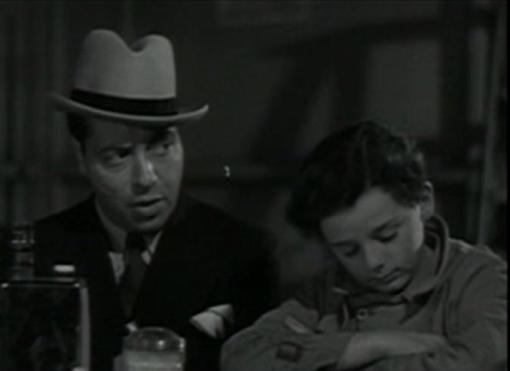
Had to get in a shot of Harold Huber as the gangster. Here he is, looking as he always does, with Freddie Bartholomew
The Devil Is a Sissy is available as a Made to Order DVD as part of the Warner Archive Collection. For all of my fellow Amazon Prime members the title can also be had at Amazon through this affiliate link
(thank you!). As of this writing The Devil Is a Sissy is next scheduled to air on Turner Classic Movies the morning of Wednesday, March 28, 2012 at 8:15 am EST. Enjoy!
Sources:
- Nugent, Frank S. “The Devil Is a Sissy.” The New York Times Film Reviews (1932-1938). New York: Times Books & Garland Publishing, Inc., 1990. 1327-1328.
- Parsons, Louella O. “Junior Stars Have Brief Reign of Screen Glory.” Charleston Gazette 1 November 1936: 34.
- Scott, Vernon. “Child Actors of 1930s Reunite in ‘Leave ’em’.” Roswell Daily Record 27 March 1981: 8.
[phpbay]freddie bartholomew|mickey rooney|jackie cooper, 12, “45100”, “”, “”, “”, 39[/phpbay]
[phpbaysidebar title=”eBay Shopping” keywords=”Freddie Bartholomew,Mickey Rooney,Jackie Cooper” num=”5″ siteid=”1″ category=”45100″ sort=”EndTimeSoonest” minprice=”39″ id=”2″]




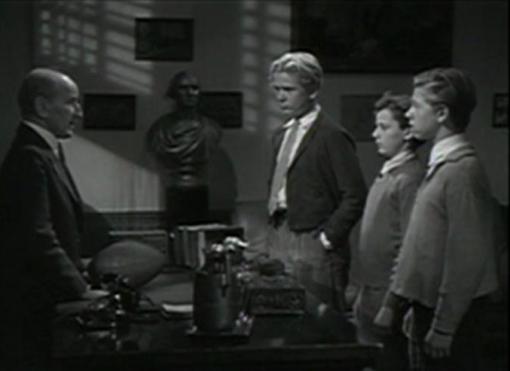
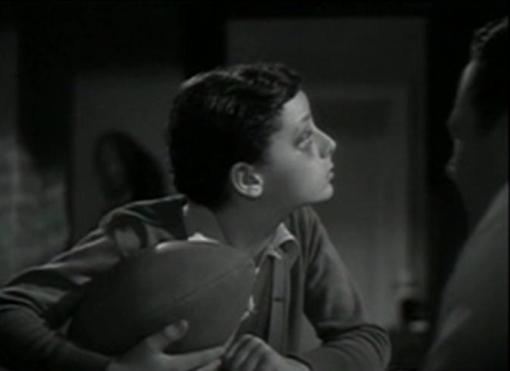



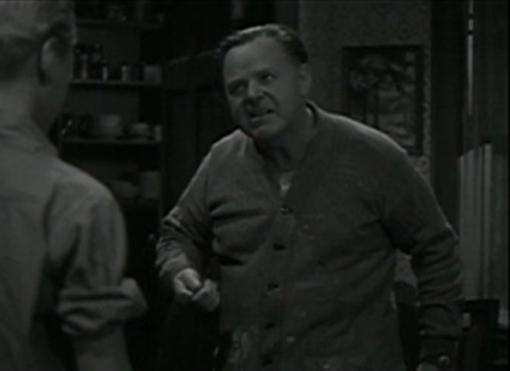

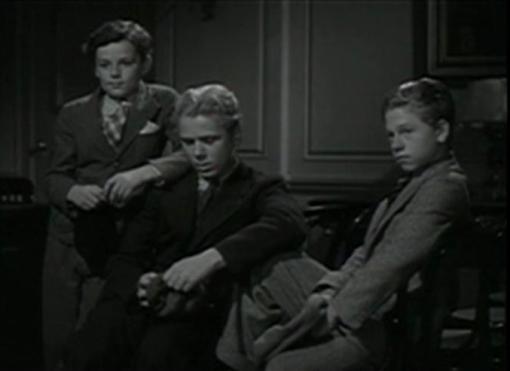


I haven’t seen this film, but your terrific review makes me want to; you really give a sense of how lively the movie is and how interesting its characters are. The best role (and performance) seems to have belonged to Mickey Rooney, who seems to have been a wasted talent, doomed by his height and round-faced boyish looks to playing the perpetual punk-adolescent roles even as he grew older. Although Freddie Bartholomew is the film’s star, Rooney seems to have the more emotionally complex and difficult role (his feelings about his executed father), which already gives an indication of his range.
@4843ec9537a11f3037fb2a4a0a16895d:disqus I wouldn’t disagree, though I am partial to Freddie Bartholomew. I like Rooney a lot too, but despite having read where many older stars of the period were simply blown away by his level of talent, I actually think Freddie had more natural talent at least by this point in time. That said I think Rooney worked the hardest here and it shows. Maybe it’d be better to say I think Freddie had more natural dramatic talent at this time as Mickey’s was more all round, able to do anything, and God knows he had energy! I really enjoy both of them quite a bit.
It’s funny, but I think Mickey’s biggest curse, his size and appearance, actually gave him staying power in the end as Jackie Cooper has already sprouted up here just before MGM cuts him loose and Freddie Bartholomew would return from service lean, lanky and over 6 feet tall. And then he was done. Rooney was able to stay young on screen longer and then slide into character parts even if it wasn’t always (ever?) smooth sailing in his adult years.
How nice to read such a positive review of this film. It is so often dismissed as second rate. I’m a 16mm collector and own a superb print of this title that is a joy to watch for all the reasons you mention in your review.
And I have to second your comments about the wonderful Ettienne Girardot. His double take is indeed hilarious. He’s one of my favorite forgotten character actors.
As for the performances of the boys, I have always felt that Rooney is clearly the winner. In his autobiography Cooper said the Rooney’s performance in “Devil is a Sissy” taught him what it was like to have a film stolen from him.
Oh, how nice to hear from a fan of this movie! The problem I’ve run into hasn’t been that people don’t like it, it’s just that nobody has seen it. I’m hoping this post steers a few towards it, especially as it is soon airing again on TCM as I write this.
I’m partial to Bartholomew but I think I gave Rooney his fair due here. I think Freddie is the most natural of the child actors during this period. He just seems to show up and demand your attention through a precociousness all the more enhanced by his accent.
I agree though that Rooney shines in this one. He works hard and while I prefer Freddie for his dramatic films of the period I’d agree that Mick has more all around talent. I haven’t read the Cooper book but it sounds like he sums up the experience pretty well!
Thanks for your response to this, hopefully we’ll hear from others come Freddie Bartholomew day on TCM’s Summer Under the Stars later this month. (The movie airs at 8 am EST on Saturday, August 18, 2012 for anyone anxious to catch it!)
Hi Cliff.
This meeting of the Devilish Sissies Appreciation Society is called to order. So far we seem to be the only two members but the door is wide open for others who want to join.
As you say, perhaps the TCM airing on the 18th will help to win a bit of an audience for this movie as well as some of the other Bartholomew films that are also difficult to find. I’m most interested in “Lord Jeff” and “Professional Soldier” as they don’t seem to be available at all, as well as “Yank at Eton.” OK, so “Eton” is a Rooney vehicle and Freddie is a supporting player, but its
great fun, and Rooney gets a chance to display a very wide range in this
movie. We see the better known high energy Rooney as well as the very
serious and deeply emotional Rooney. Again, like “Devil is a Sissy,”
its not one of the great films, but absolutely worth seeing.
I’ve got a 16mm print of “Yank at Eton,” that is rather banged up and missing bits and pieces – about 15 minutes total is missing – but what is there has great image and sound quality. The date code at the edge of the print is 1942, the year of the film’s release, and I’m guessing that it might be one of the 16mm prints the studios made for screenings in military theaters in WWII in advance of release to civilian theaters. For years I’ve hunted for another print so that I could patch the two together for a complete print but haven’t found even a partial print, so I’m very glad for the upcoming TCM airing.
Only problem with expanding the club on the 18th is “Devil” airing so early. I’ll be rallying folks from Twitter and Facebook to set their DVRs the night before though!
“Professional Soldier” is the key title I need for Freddie. Never saw it. Everything else I caught early last year when I was putting together my big biography of him (summed up here).
I like “Lord Jeff” for Freddie’s nasty character, but it reveals what I think of as Rooney’s one (only?) major weakness–he can’t do accents. All American boy, full of energy, perfect. But I believe this is the one where he tries to lay on an Irish brogue throughout and it just doesn’t work for me at all. Distract me the entire movie.
Yes, “Yank at Eton” is good Mickey and enjoyable, but limited, Freddie. Pointing to the TCM August 18 schedule again, it’s a shame they’ve got this one on so early (it’s leads off at 6 am). After a day of Freddie Bartholomew movies people should be curious to see what happened to him–he sprouted up and lost his appeal with his height and “Yank” is the only one of the TCM schedule that shows this. Not a good way to start off, especially for someone actually turning on the TV at 6 am to see what Freddie Bartholomew is all about!
All that aside, good movie though!